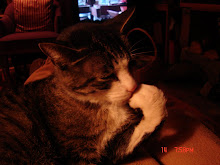
More on my father. Last post I mentioned that he made me feel right with my life. Isn't that what fathers are meant to do? I tend not to trust my memory when it's events I'm recalling. Those memories could be the collective memory of family stories. I do trust memories of feelings. Nobody can know how I felt so those memories are mine. So when I say my father made me feel right, that's a powerful memory specifically associated with my dad.
I'm not minimizing the value of collective memory because that's the family history that I'm attempting to save for Maya to draw on when it's her turn to tell the stories. They will change over time but the kernel of truth will remain constant.
My father was the non-intellectual son in a household of intellectuals. He was the last born and entered the world when my Opa was already on the downward slide of prideful self- destruction. His business was failing because he wouldn't allow his shop to be unionized. He had used up his wife's dowry and the family was forced to move often. Because my aunts were older, their academic patterns were already established, but my dad was still a young lad and couldn't hold his own in in the ever changing schools. So when Oma's cousin, my Jewish Tante Betsy settled scholarships on Oma's children, she was advised not to waste her money on Jan, because he was not a scholar. He was expected to learn a trade and go to work.
Opa (my grandfather) had won many awards for his craft. He was a first-class lithographer and book-binder who taught my dad his trade. Although my father never regretted learning the trade, it was a far cry from his dream of becoming a veterinarian. My father learned to settle very early. Once my Opa died, my father decided to leave the business of book making and emigrate to Canada as a farm worker. He had learned horsemanship as a conscript in the Dutch army and felt he had the requisite brawn and skills to make a good farm hand. It also allowed him the opportunity of escaping the orbit of his mother and sisters. They were not impressed with his decision but wisely offered little resistance. That is how my father came to Canada the first time, at the age of twenty-one. He began his love affair with Canada then and it remained steadfast until his untimely death at 52.
That trip opened the world to him. He started on a farm in the Hamilton area and eventually became a horse trainer just outside Ottawa. There are some wonderful photos of a handsome young farmer leaning against a Model T Ford with one foot on the running board. Other photos show a more mature man wearing a fedora style hat, leading a horse out of a stable. These were adventures prior to his meeting my mother. Once he met my mother he was already very ill with a lung infection that spelled the end of his happy life in Canada. He would be deported back to Holland once he was discharged from the hospital. My mother was his nurse.


